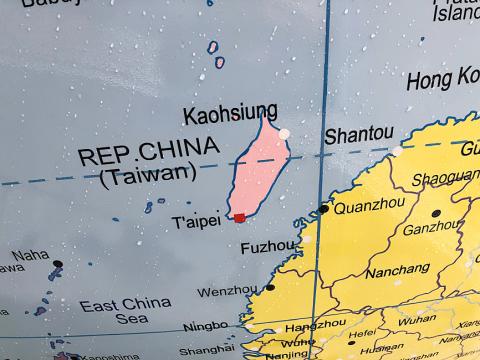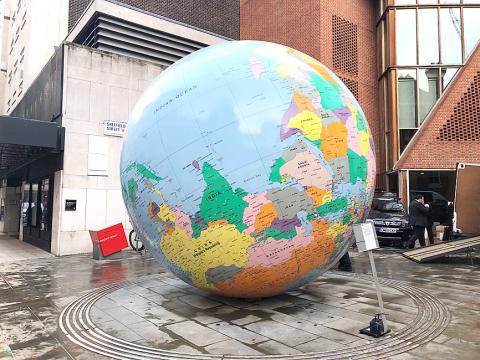The Ministry of Foreign Affairs has expressed its concern to the London School of Economics (LSE) after the school decided to change the design of a campus sculpture to depict Taiwan as part of China.
The ministry has asked its representative office in the UK to demand that the school reconsider the decision, which belittles Taiwan’s sovereign status, spokesman Andrew Lee (李憲章) said.
Lee’s comments came in response to a decision by the LSE to change the painting of a sculpture to show that Taiwan is part of the People’s Republic of China (PRC).

Photo: CNA
On Tuesday last week, the LSE unveiled the new sculpture by the Turner Prize-winning artist Mark Wallinger outside its Saw Swee Hock Student Centre.
The World Turned Upside Down is a large political globe, 4m in diameter, with nation states and borders outlined, but with “the revolutionary twist of being inverted,” according to the LSE Web site.
Most of the landmasses now lie in the “bottom” hemisphere, with nations and cities labeled for this new orientation, it says.

Photo: CNA
However, after the sculpture’s unveiling, Chinese students at LSE noticed that Taiwan was in a different color to China and they protested.
“We are deeply disappointed by this arrangement, and we firmly hold the position that Taiwan is a part of China and the PRC should be the only legal representative of China,” a statement released by Chinese LSE students said.
They called on the school to take action “to prevent any future confusion resulting from the sculpture.”
Taiwanese students at LSE issued their own statement, calling on the school to keep the original design with the Republic of China (ROC) as a separate sovereign state.
“As a sovereign state, the ROC [Taiwan] has its own democratic political institution, and respects the separation of powers and rule of law. We have our own ministries of diplomacy, national defense and interior affairs, with which PRC has no interference,” a letter from the Taiwanese students to the school said.
“Altering the content of the original sculpture not only disrespects the artist, but also denies the fact that the ROC is a sovereign state and further influences the understanding of Taiwan in the LSE community,” it added.
Following a meeting on Wednesday between Taiwanese students and their Chinese counterparts organized by the school, the LSE decided to accept the latter’s proposal to change the globe’s original design by making Taiwan the same color as the PRC.
The school pointed out that all maps released by the UN show Taiwan as a part of the PRC, making it difficult for the Taiwanese students to convince the school to keep the original design, Taiwanese LSE student Huang Li-an (黃立安) said.
The LSE put up a sign beside the sculpture saying that it understood and respected “that strong feelings exist around statehood and identity,” but called on students to engage in respectful exchanges on such issues.

CHAOS: Iranians took to the streets playing celebratory music after reports of Khamenei’s death on Saturday, while mourners also gathered in Tehran yesterday Iranian Supreme Leader Ayatollah Ali Khamenei was killed in a major attack on Iran launched by Israel and the US, throwing the future of the Islamic republic into doubt and raising the risk of regional instability. Iranian state television and the state-run IRNA news agency announced the 86-year-old’s death early yesterday. US President Donald Trump said it gave Iranians their “greatest chance” to “take back” their country. The announcements came after a joint US and Israeli aerial bombardment that targeted Iranian military and governmental sites. Trump said the “heavy and pinpoint bombing” would continue through the week or as long

TRUST: The KMT said it respected the US’ timing and considerations, and hoped it would continue to honor its commitments to helping Taiwan bolster its defenses and deterrence US President Donald Trump is delaying a multibillion-dollar arms sale to Taiwan to ensure his visit to Beijing is successful, a New York Times report said. The weapons sales package has stalled in the US Department of State, the report said, citing US officials it did not identify. The White House has told agencies not to push forward ahead of Trump’s meeting with Chinese President Xi Jinping (習近平), it said. The two last month held a phone call to discuss trade and geopolitical flashpoints ahead of the summit. Xi raised the Taiwan issue and urged the US to handle arms sales to

State-run CPC Corp, Taiwan (CPC, 台灣中油) yesterday said that it had confirmed on Saturday night with its liquefied natural gas (LNG) and crude oil suppliers that shipments are proceeding as scheduled and that domestic supplies remain unaffected. The CPC yesterday announced the gasoline and diesel prices will rise by NT$0.2 and NT$0.4 per liter, respectively, starting Monday, citing Middle East tensions and blizzards in the eastern United States. CPC also iterated it has been reducing the proportion of crude oil imports from the Middle East and diversifying its supply sources in the past few years in response to geopolitical risks, expanding

Pro-democracy media tycoon Jimmy Lai’s (黎智英) fraud conviction and prison sentence were yesterday overturned by a Hong Kong court, in a surprise legal decision that comes soon after Lai was jailed for 20 years on a separate national security charge. Judges Jeremy Poon (潘兆初), Anthea Pang (彭寶琴) and Derek Pang (彭偉昌) said in the judgement that they allowed the appeal from Lai, and another defendant in the case, to proceed, as a lower court judge had “erred.” “The Court of Appeal gave them leave to appeal against their conviction, allowed their appeals, quashed the convictions and set aside the sentences,” the judges